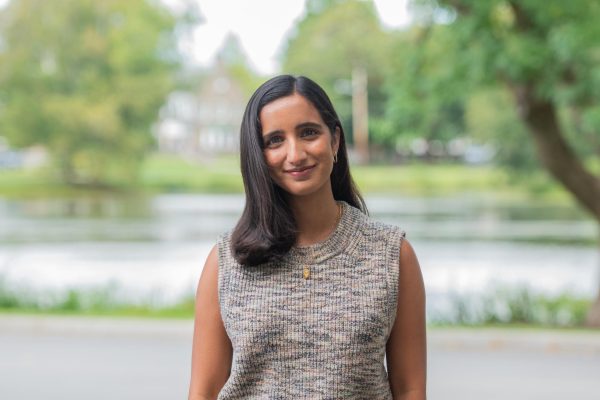Professors Roller and Santiago Juarez Discuss the Pandemic’s Impact on Indigenous Peoples in South America
November is Native American Heritage Month. As part of their ongoing series, “Experiences of the Pandemic in the Native Americas,” ALANA hosted a virtual event for Native American Heritage Celebration. Associate Professor of History and the Director of the Native American Studies Program Heather Roller and Assistant Professor of Anthropology Santiago Juarez spoke at the event about the impact of COVID-19 in Brazil and the town of Cerra Bello Metzabok, respectively. Roller shared her perspective when asked about the importance of the event.
“Our idea was to highlight common experiences but also differences in the ways that indigenous groups are experiencing the pandemic across the hemisphere,” she said.
Roller’s presentation focused on the Amazonian region of Brazil and discussed how the pandemic has affected the native populations there. Brazil has endured one of the deadliest COVID-19 outbreaks and is currently enduring a second wave. The virus has spread quickly through the Amazon region and is especially lethal to indigenous groups, according to Roller. Roller also discussed the misunderstanding in the media on how the virus is affecting these indigenous groups. She explained that what makes indigenous groups in Brazil vulnerable to the coronavirus is not the same as what has made them vulnerable to illnesses historically, such as being immunologically unprepared for viruses like measles or the flu.
“Today many are vaccinated and have built up natural immunities through regular contact with non-indigenous people over the decades or centuries. But COVID-19 is new to everyone and has caught all of us unprepared, immunologically speaking,” Roller said.
Roller explained that a variety of political, social and environmental factors have made indigenous groups increasingly susceptible to the virus. Some of these factors include poor access to healthcare, high rates of malnutrition and diabetes that are exasperated by the virus, lack of access to hygienic products, multi-generational living situations that make it difficult for people to quarantine safely and the encroachment of their lands by illegal loggers and miners.
Juarez’s presentation focused on the people of Cerra Bello Metzabok (located in Mexico) and the lack of governmental responsibility for curbing the virus in that area. Juarez discussed the struggles that Lacandon people in the area face in the era of COVID-19, specifically with regards to their dependence on tourism. The current lack of tourists in the region has left them in a state of financial unrest.
Both professors discussed how responses from the country’s respective governments and leaders have affected how communities are combatting the virus. For instance, Juarez discussed how Mexico’s government has ignored the seriousness of the pandemic and warped the narrative of COVID-19 in order to not have their nation’s economy derailed by the economy. Roller discussed that the President of Brazil has largely downplayed the virus, and that, coupled with policies towards indigenous people that have made native peoples distrust him, have created a harmful political atmosphere. Roller also mentioned that native people in Brazil do not believe what the leader says about the virus and feel that he is targeting them in order to take away their territories and autonomy within those territories.
When asked what Colgate community members can do to help the situation many indigenous groups are confronted with during the pandemic, both professors suggested financially supporting Non Government Organizations (NGOs) that are doing important work in terms of delivering food and hygiene products to areas that need them. Roller suggested supporting Cultural Survival, a nonprofit organization based in Cambridge, Mass. that works to defend the rights of indigenous people and is involved in COVID-19 related charity work. Juarez suggested supporting Doctors Without Borders, an organization known for helping conflict zones affected with serious diseases.
The COVID-19 pandemic has affected people in different ways, and this event showed that the way many people in North America have been dealing with the virus is not the same as indigenous people in Central or South America.
“I think it’s important to emphasize that Indigenous peoples have been dealing with these forms of disruption for a long time; they tend to understand that ecological collapse and pandemic disease are connected,” Roller said. “They have ideas to share on how to restore our relationship with nature and protect ourselves from disease, and it’s worth listening to them.”

Maya Karkhanis is a senior from Hillsborough, NJ concentrating in international relations, religion, and Asian studies. She has previously served as an...





